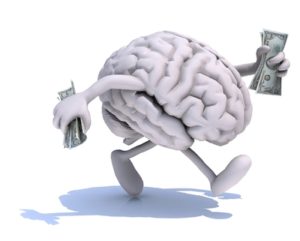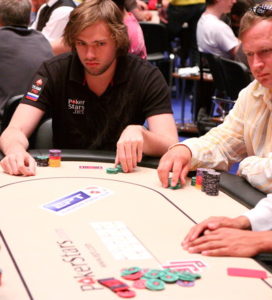 Poker is a game that requires more than just luck and strategy. In fact, the mental aspect of poker is just as important, if not more so, than the physical skills. Being able to maintain focus, manage emotions, and make sound decisions under pressure can greatly improve your chances of winning at the poker table.
Poker is a game that requires more than just luck and strategy. In fact, the mental aspect of poker is just as important, if not more so, than the physical skills. Being able to maintain focus, manage emotions, and make sound decisions under pressure can greatly improve your chances of winning at the poker table.
On this page, we will aim to explore the power of mental skills and how they can give you an edge in your game of poker. So, get ready to harness the power of your mind for a winning game of poker.
Understanding The Psychology Of Poker
 In order to truly master the game of poker, it is crucial to have a deep understanding of the psychology behind it. Poker is not simply a game of chance, but rather a game of skill, strategy and mental fortitude. Understanding the psychology of poker can help players improve their game and increase their chances of winning.
In order to truly master the game of poker, it is crucial to have a deep understanding of the psychology behind it. Poker is not simply a game of chance, but rather a game of skill, strategy and mental fortitude. Understanding the psychology of poker can help players improve their game and increase their chances of winning.
One key aspect of poker psychology is understanding the concept of tilt. Tilt refers to a state of emotional and mental frustration that can negatively impact a player’s decision making process and overall performance. Recognising and managing tilt is essential for maintaining focus and making rational decisions at the poker table.
Another important psychological factor in poker is the ability to read and interpret your opponents’ behaviour. Being able to understand their body language, facial expressions and betting patterns can give you valuable insight into the strength of their hand. This can help you make more accurate choices which will in turn elevate your chances of success.
Lastly, having a solid understanding of the strategy behind the game is crucial for success in poker. This includes understanding the probabilities of different card combinations, knowing when to bet, fold, or raise and being able to adapt your strategy based on the current situation.
By improving your understanding of the psychology behind poker, you can enhance your decision making abilities, manage your emotions more effectively and ultimately increase your chances of winning. So, next time you sit down at the poker table, remember that your mental game is just as important as your physical skills.
Key Mental Skills For Successful Playing Poker
![]() Mastering the mental skills necessary for successful poker playing is crucial for anyone looking to improve their game. Whilst luck and strategy are important, it’s the mental aspect that can truly set you apart from the other players. Here are some key mental skills that can greatly enhance your poker playing abilities.
Mastering the mental skills necessary for successful poker playing is crucial for anyone looking to improve their game. Whilst luck and strategy are important, it’s the mental aspect that can truly set you apart from the other players. Here are some key mental skills that can greatly enhance your poker playing abilities.
First and foremost, discipline is essential. This means having the self control to stick to your game plan and make rational decisions, even in the face of challenging circumstances. It would be easy to let your emotions get the better of you when things don’t go your way, but maintaining self discipline will help you stay focused and make better choices.
Another crucial mental skill is patience. Poker is a game of patience, and understanding when to wait for the right moment is essential. Being able to stay calm and composed, even during long stretches of not so great hands, is what separates the pros from the amateurs.
Next, adaptability is key. The ability to quickly adjust your strategy based on circumstances changing around you can make a significant difference in your success. Being able to read the table and adjust your playstyle accordingly will give you an edge over less flexible opponents.
Lastly, confidence is crucial for playing poker successfully. Having confidence in your abilities and decision making will allow you to play your best game without second guessing yourself. Confidence also helps to project a strong image at the table, which can influence your opponents’ perceptions of you and give you an advantage.
By developing and honing these key mental skills, you will be well on your way to becoming a more successful poker player. Remember, poker is not just about the cards you’re dealt, but how you use your mental prowess to outplay your opponents.
Practical Techniques To Enhance Your Poker Mental Game
 Mastering the mental game of poker requires more than just understanding the psychology and key mental skills. It also involves implementing practical techniques to enhance your overall mental game. Here are some practical techniques that can help you take your poker mental skills to the next level.
Mastering the mental game of poker requires more than just understanding the psychology and key mental skills. It also involves implementing practical techniques to enhance your overall mental game. Here are some practical techniques that can help you take your poker mental skills to the next level.
One technique is mindfulness meditation. Taking a couple of minutes each day to practise mindfulness meditation can help improve your focus and concentration at the poker table. By learning to stay present in the moment and not getting caught up in past losses or future outcomes, you can make better decisions and maintain a calm and composed state of mind.
Another technique is visualisation. Before playing a game of poker, spend some time visualising yourself playing confidently and making successful moves. Visualise yourself staying focused, managing your emotions and making smart decisions. By visualising success, you can boost your confidence and create a positive mindset that will support your performance at the poker table.
In addition, developing a routine before each game can help you get in the right mindset before playing. This routine can include activities such as stretching, deep breathing exercises or simply going over your game plan. Having a consistent routine can help you feel more prepared and mentally ready to tackle the challenges of the game.
Lastly, seeking feedback and self reflection is crucial for improvement. After each game, take some time to review your performance and identify areas for growth. Ask for feedback from other experienced players or consider hiring a poker coach to provide guidance and support. Being open to feedback and constantly striving for improvement can greatly enhance your mental game.
By implementing these practical techniques, you can enhance your poker mental game and increase your chances of success when playing poker. Remember, poker is not just about luck and strategy, but also about harnessing the power of your mind. So, start practising these techniques and watch your game improve.
Overcoming Mental Blocks And Staying Focused
![]() In the intense and competitive world of poker, it is common to encounter mental blocks and distractions that can hinder your performance. However, overcoming these mental hurdles and staying focused is essential for success at the table. So, how can you navigate through these challenges and maintain a clear and focused mind?
In the intense and competitive world of poker, it is common to encounter mental blocks and distractions that can hinder your performance. However, overcoming these mental hurdles and staying focused is essential for success at the table. So, how can you navigate through these challenges and maintain a clear and focused mind?
As we have already noted, one effective strategy is to develop a pre-game routine that includes relaxation techniques such as deep breathing or visualisation exercises, all of which can help you to calm your mind, reduce anxiety while preparing you for the game ahead. Additionally, setting specific goals for each session can help keep your mind engaged and focused on the task at hand.
Another key technique is to practise mindfulness during gameplay. Mindfulness involves being fully present and aware of the current moment, without judgement or attachment to outcomes. By staying present, you can avoid worrying about previous losses or obsessing over what might happen next. This allows you to make better decisions and respond more effectively to the game.
Furthermore, managing your emotions is crucial for staying focused. It’s natural to experience highs and lows during a poker session but allowing emotions to cloud your judgement can lead to making poor choices. Take breaks when necessary, practise self control and develop the strategies necessary to handle any negative emotions that may arise.
Finally, it is important to remember that staying focused is a skill that requires practice and consistency. The more you train your mind to stay focused, the easier it will become to overcome mental blocks and distractions. By incorporating these techniques into your poker routine, you will be better equipped to overcome mental challenges and maintain a focused mindset for the optimal poker performance.
Implementing Psychological Tactics In Real Poker Scenarios
 Now that you have a solid understanding of the psychology behind poker and the key mental skills that are required to be successful, it’s time to put that knowledge into action. Implementing psychological tactics in real poker scenarios can give you a significant advantage over your opponents.
Now that you have a solid understanding of the psychology behind poker and the key mental skills that are required to be successful, it’s time to put that knowledge into action. Implementing psychological tactics in real poker scenarios can give you a significant advantage over your opponents.
One tactic to consider is bluffing. Bluffing is a strategic move where you make your opponents believe that you are holding a stronger hand than you actually have. This can intimidate them into folding, giving you the pot even if you have a weaker hand. However, bluffing should be used sparingly and with caution, as it can backfire if your opponents catch on and call your bluff.
Another psychological tactic is using reverse psychology. This involves giving off false signals or intentionally making unconventional moves to confuse your opponents. By appearing weak when you are actually strong, or vice versa, you can manipulate their decisions and gain an upper hand in the game.
Additionally, using the power of observation is a valuable tactic. Pay close attention to your opponents’ behaviour, such as their betting patterns or physical cues. This information can help you make more informed decisions and exploit their weaknesses.
Lastly, maintaining a strong and confident image at the table can have a psychological impact on your opponents. Projecting confidence and control can make them doubt their own abilities and decision making, potentially leading to mistakes that work in your favour.
Remember, implementing psychological tactics requires practice and experience. It is important that you adapt your approach based on the specific situation and the opponents that you’re facing. By incorporating these tactics into your poker game, you will be able to use your mental skills to work in your advantage and increase your chances of winning.
